F1, F2, S1, IBL And BX: Deciding Which Plants Are Best To Breed Through Decoding The Genetics Of Cannabis

For cannabis cultivators everywhere, finding the best genetic composition and preserving those traits over time is essential. Many growers also strive to innovate by cross-breeding their plants to develop strains with unique effects and features. So how does this process actually work, and why is understanding cannabis genetics beneficial for you?
How Do You Breed Cannabis Plants?
Cannabis breeding is typically done by experienced growers, but understanding the fundamentals is helpful for everyone. Breeding starts when a male cannabis plant from one strain pollinates a female plant from another, combining their genetics. The resulting seeds carry mixed traits and are referred to as hybrid strains. To do this, you’ll need to set up a pollination chamber away from your other plants so there is no cross-pollination occurring. Your male plant will be guaranteed to pollinate the female plant, which will continue producing buds but will also be producing seeds as well.
Disclaimer: Cannabis cultivation, possession, and use must comply with local laws. This content is intended for readers in regions where cannabis use is legally permitted. Please check your local laws before purchasing, cultivating, or breeding cannabis strains.
The Basics Of Cannabis Genetics
If you want to breed cannabis strains into new hybrid seed types, it’s important to know what specific terminology is used when describing cannabis genetics and lineages. If you’re buying cannabis seeds to grow, this is also useful information to know so you can identify the exact strains from which your seeds have descended.
What Is Meant By F1?
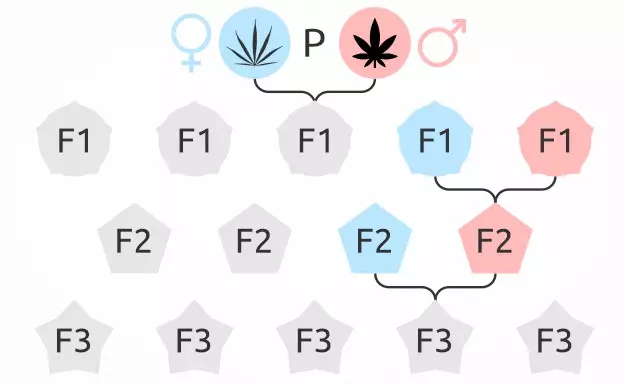
F1 refers to “first-generation hybrid,” meaning the direct offspring of selected parent plants. These cannabis seeds are produced from the initial pollination event. F1 seeds are generally the most stable hybrids since they haven’t undergone further genetic mixing. This subsequent generation is what’s referred to as F2.
The Difference Between F1 And F2
F2, or “second-generation hybrid,” is the second generation of seeds that are produced after your F1 cannabis seeds have flowered and had the chance to breed with its brother and sister plants of the same generation. Two F1 strains that have been bred together create the F2 seed hybrids, two F2 strains that are bred create F3 seed hybrids, and so on.
How Selfing Produces S1 Seeds
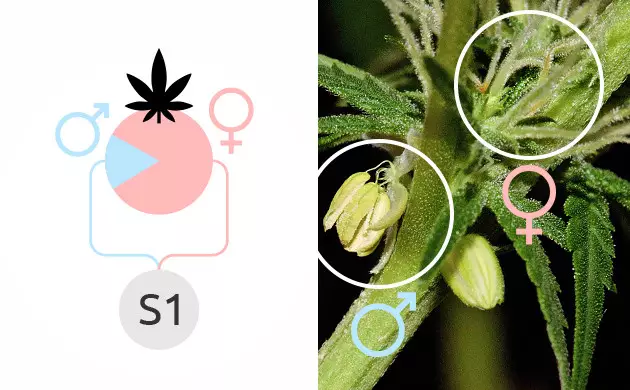
Female plants can produce S1 seeds through a process called “selfing”. Selfing is a chemically-induced process by breeders that causes female plants a certain amount of stress, resulting in them producing male flowers. These male flowers will then produce pollen, which pollinates the rest of the plant through self-pollination. Female plants that have self-pollinated will then produce what is known as stable S1 seeds, or seeds that have been “selfed”.
What Are IBL Seeds?
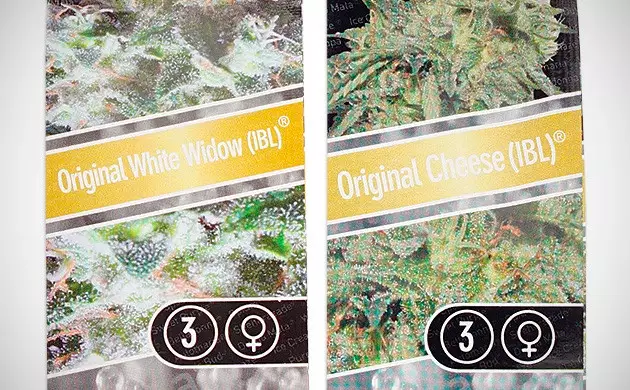
IBL seeds, or “inbred line” seeds, are in-bred descendants of the original F1 cannabis seed hybrids. The term IBL is typically adopted after the F line has reached F5. Successful IBL breeding occurs after so much hybridization between plants of the same lineage that the IBL becomes almost like a strain of its own variety, having been bred from plants with near-identical genetics. IBL seeds have most likely been bred together to preserve and maximize certain desired traits, such as the pungency of the Skunk family.
BX: Explaining The Process of Backcrossing
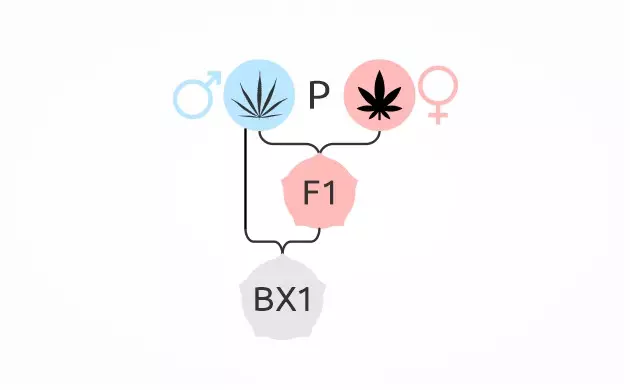
Backcrossing in cannabis breeding is the process of taking an F1 hybrid strain and breeding it with the original parent plant. The genetics of the F1 strain are crossed with the parent plant’s genetics, and the resulting seeds are referred to as BX1. Backcrossing cannabis plants is essentially how to stabilize a strain – in other words, how to preserve and guarantee certain desired traits that are shown in a particular plant.
What Are Fast Versions Of Seeds?

Certain strains have been bred to possess the stable and reliable qualities of autoflowers, which are known as “fast versions” or “early versions” seeds. These are F1 plants that have been bred with a strain of Ruderalis, which is known to be a very sturdy family of cannabis. Fast versions are best for growers who are new to growing, or who want something that will produce cannabis very quickly.
What Should I Pick?
In the end, you should choose the seed that is the most stable, meaning a seed with reliable genetics where you know exactly what you’re going to get when you plant it, such as an F1, S1 or BX. If you’re looking at breeding cannabis yourself, it all depends on what types of strains you’re looking to grow more of or whether you want to experiment with breeding plants through cross-pollination. Regardless, it’s important to know how each type of cannabis strain is formed and its genetic history so you can be aware of exactly what you’re smoking.
Disclaimer: While cross-breeding cannabis strains can be an interesting area of study, always ensure that your activities align with local laws regarding cannabis breeding and cultivation.
Making Sense Of Cannabis Terminology
Although it seems confusing on the surface with so many letters and numbers, understanding the basics of cannabis genetics and cross-breeding will help you in the future to decide what you want to smoke, what you want to grow and if ever necessary, how and what you’ll want to breed together to get exactly what you’re looking for.
Disclaimer: Before purchasing and growing cannabis seeds, ensure that cannabis cultivation is legal in your region. Prior use consult your medical adviser.
Herbies Head Shop expressly refuses to support the use, production, or supply of illegal substances. For more details read our Legal Disclaimer.










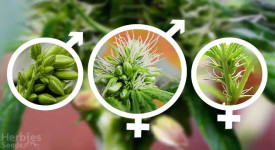



Thank you for leaving a comment for us!
Your feedback will be posted shortly after our moderator checks it.
Please note that we don’t publish reviews that: